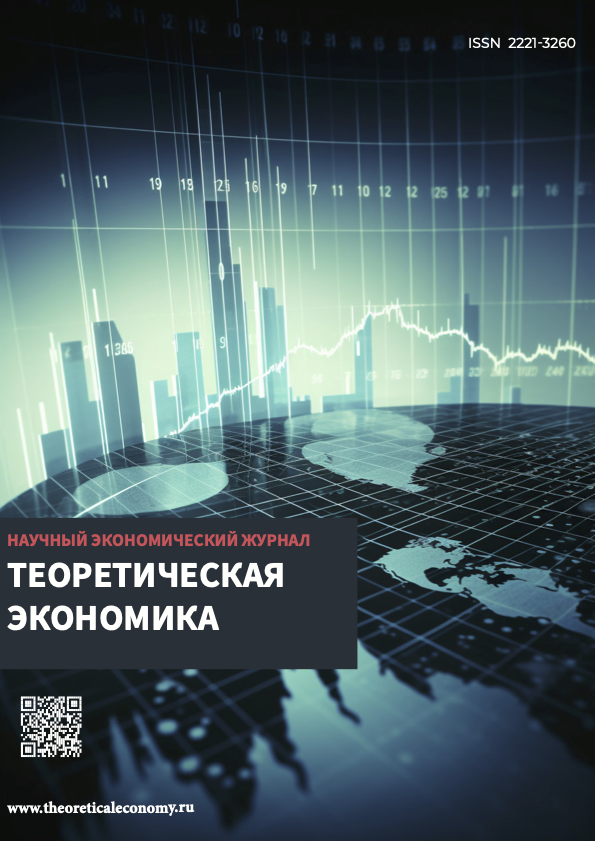Ivanovo, Ivanovo, Russian Federation
Ivanovo, Ivanovo, Russian Federation
The article analyzes the activities of credit rating agencies in an institutional theoretical aspect within the framework of a methodological approach designated as a synthesis of political economy and institutionalism. This methodological approach has been used for about twenty years in the research of economic phenomena and processes at Ivanovo State University in the tradition of the scientific school of Professor B. D. Babayev. The presented material focuses on institutional economics. Based on the theories that make up the institutional direction of economic theory (theory of contracts, organization, transaction costs, opportunistic behavior, public choice, etc.), the significance and functions performed by rating agencies as an element of the financial market infrastructure are determined. The mechanism by which rating agencies reduce the risks associated with such problems considered within the framework of institutional economics as principal-agent, false choice, unfair (opportunistic) behavior is disclosed. The authors noted that the category of «trust» is one of the key activities of credit rating agencies as an institution. The study revealed that credit rating agencies are financial market institutions, defining the rules of behavior of rated persons. At the same time, the activities of agencies need to be regulated by the state due to the fact that they are quasi-public organizations (this characteristic was obtained by the authors within the framework of a political and economic approach). The functions of credit rating agencies are highlighted, which confirm the close connection of the elements of the market infrastructure with the financial market itself and the inexpediency of its research in isolation from the relevant market. The role and place of rating agencies in servicing the movement of loan capital and the functioning of the stock market are determined.
credit rating agencies, institutional approach, institute, principal agent, false choice, unfair behavior, contract, trust, financial market infrastructure
1. George A. Akerlof. The Market for «Lemons»: Quality Uncertainty and the Market Mechanism // The Quarterly Journal of Economics, v.84, August 1970. p.488-500.
2. White.B. Do Rating Agencies Make the Grade? The Washington Post. URL: https://www.washingtonpost.com/archive/business/2002/01/31/do-rating-agencies-make-the-grade/9482b73e-5199-40b2-985f-8f3c3084b8f4/ (data obrascheniya 11.02.23)
3. Gelbreyt Dzh. Novoe industrial'noe obschestvo. Izbrannoe. / Dzh. K. Gelbreyt. M.: Eksmo, 2008. – 1200 s.
4. Gur'eva O. Yu. Pensionnoe delo: vzaimosvyaz' politiko-ekonomicheskogo i institucional'nogo podhodov: avtoreferat dis. ... doktora ekonomicheskih nauk : 08.00.01 / Gur'eva Ol'ga Yur'evna; [Mesto zaschity: Ivan. gos. un-t]. Ivanovo, 2010. 39 s.
5. Zenov S. V. Institucional'nyy podhod v analize infrastrukturnyh organizaciy finansovogo rynka (na primere kreditno-reytingovyh agentstv) // Vestnik Ivanovskogo gosudarstvennogo universiteta. Seriya «Ekonomika». 2022. № 1. S. 83-89. [Elektronnyy resurs] - Rezhim dostupa k zhurn. svobodnyy: http://ivanovo.ac.ru/upload/medialibrary/57e/%D0%92%D0%AD_22-1.pdf
6. Zenov S. V. Kreditno-reytingovoe agentstvo kak kvaziobschestvennaya organizaciya i perspektivy ego razvitiya // Nauchno-issledovatel'skaya deyatel'nost' v klassicheskom universitete: tradicii i innovacii: mat-ly Mezhdunarodnogo nauchno-praktich. festivalya, Ivanovo, 19–29 aprelya 2021 g. Ivanovo: Ivan. gos. un-t, 2021. 1154 s. S. 790-796.
7. Koryagina T. M. Sberezheniya: vzaimosvyaz' politekonomicheskogo i institucional'nogo aspektov: avtoreferat dis. ... kandidata ekonomicheskih nauk: 08.00.01 / Koryagina Tat'yana Mihaylovna; [Mesto zaschity: Ivan. gos. un-t]. Ivanovo, 2014. 22 s.
8. Metodologiya prisvoeniya kreditnyh reytingov po nacional'noy shkale dlya Rossiyskoy Federacii nefinansovym kompaniyam (Nacional'nye Kreditnye Reytingi). URL: https://ratings.ru/ methodologies/current/ (data obrascheniya 14.02.23)
9. Nikolaeva E. E., Azarova T. V. Konkurenciya kak ekonomicheskoe otnoshenie i kak institut: metodologicheskiy aspekt // Teoreticheskaya ekonomika. 2017. № 6. S. 38-49. [Elektronnyy resurs] - Rezhim dostupa k zhurn. svobodnyy: http://www.theoreticaleconomy.ru
10. Nort D. Instituty, institucional'nye izmeneniya i funkcionirovanie ekonomiki / per. s angl. A. N. Nesterenko; predisl. i nauch. red. B. Z. Mil'nera. M. : Fond ekonomicheskoy knigi «Nachala», 1997. 180 s. (Sovremennaya institucional'no-evolyucionnaya teoriya).
11. Perspektivy razvitiya industrii kreditnyh reytingov: regulirovanie i spros. (2021 g.) // Reytingovoe agentstvo Ekspert-RA. URL: https://www.raexpert.ru/press/articles/mitrofanov_bosfera_ jun2021/ (data obrascheniya 15.03.23).
12. Popova T. K. Otchuzhdenie truda kak sistema ekonomicheskih otnosheniy na urovne predpriyatiya: vzaimosvyaz' politekonomicheskogo i institucional'nogo aspektov: avtoreferat dis. ... kandidata ekonomicheskih nauk: 08.00.01 / Popova Tat'yana Konstantinovna; [Mesto zaschity: Ivan. gos. un-t]. Ivanovo, 2009. 22 s.
13. Puzyr' dotkomov // BKS Ekspress. URL: https://bcs-express.ru/novosti-i-analitika/chto-takoepuzyr-dotkomov-kak-pereotsenili-aktsii-internet-kompanii (data obrascheniya 09.02.23)
14. Radaev V. V., Azarova M. M. Politicheskaya ekonomiya. M.: Politizdat, 1988. 496 s.
15. Rodnina A. Yu. Krugooborot kreditnogo resursa: vzaimosvyaz' politiko-ekonomicheskogo i institucional'nogo aspektov: avtoreferat dis. ... doktora ekonomicheskih nauk: 08.00.01 / Rodnina Anna Yur'evna; [Mesto zaschity: Ivan. gos. un-t]. Ivanovo, 2015. 42 s.
16. Uchastniki finansovogo rynka hotyat bol'she kreditnyh reytingov. Data publikacii 29.05.17. Reytingovoe agentstvo AKRA. Analitika. URL: https://www.acra-ratings.ru/research/ (data obrascheniya 15.02.23)
17. Filatov E. A. Analiz mezhdunarodnyh finansovo-ekonomicheskih krizisov // Upravlenie ekonomicheskimi sistemami: elektronnyy nauchnyy zhurnal. 2019. № 11. S. 1-20.
 This work is licensed under Creative Commons Attribution-NonCommercial-NoDerivatives 4.0 International
This work is licensed under Creative Commons Attribution-NonCommercial-NoDerivatives 4.0 International












